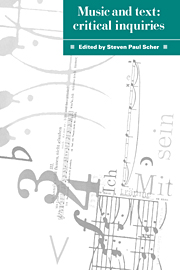Book contents
- Frontmatter
- Contents
- List of figures
- List of contributors
- Preface
- Acknowledgments
- Part I Institutional dimensions and the contexts of listening
- Part II Literary models for musical understanding: music, lyric, narrative, and metaphor
- Part III Representation, analysis, and semiotics
- 8 Music and representation: the instance of Haydn's Creation
- 9 Musical analysis as stage direction
- 10 Poet's love or composer's love?
- 11 The semiotic elements of a multiplanar discourse: John Harbison's setting of Michael Fried's “Depths”
- Part IV Gender and convention
- Index
10 - Poet's love or composer's love?
Published online by Cambridge University Press: 04 September 2009
- Frontmatter
- Contents
- List of figures
- List of contributors
- Preface
- Acknowledgments
- Part I Institutional dimensions and the contexts of listening
- Part II Literary models for musical understanding: music, lyric, narrative, and metaphor
- Part III Representation, analysis, and semiotics
- 8 Music and representation: the instance of Haydn's Creation
- 9 Musical analysis as stage direction
- 10 Poet's love or composer's love?
- 11 The semiotic elements of a multiplanar discourse: John Harbison's setting of Michael Fried's “Depths”
- Part IV Gender and convention
- Index
Summary
Some fifteen years ago a short book of mine put forward the idea of the vocal persona, a concept equally applicable to the characters in an opera and to the protagonists of art song (to use a barbaric but convenient locution). Such personas obviously differ from the purely verbal personas of the poetic text inasmuch as “they express themselves at least as much by melody as by speech, and as much by tone-color as by phonetic sound.” That is to say, “the vocal persona adopts the original simulation of the poetic persona and adds another of his own: he ‘composes’, not the words alone, but the vocal line as well. We admittedly connive at this pretense when we watch an opera, but we should realize that a similar situation must obtain if we really attend to a performance of a Schubert Lied. For if we try to follow words as well as music, we must accept the song, no less than the opera, as a dramatic presentation.”
On the other hand, as I pointed out, very often – perhaps most of the time – such a persona “[f]rom the point of view of the implied or enacted drama … is not ‘really’ singing at all.” To be sure the singer sings, but the character portrayed is usually speaking. “From the realistic point of view, such a character is unaware of singing, and of being accompanied. Yet on the musical levels he must in some sense be aware of both.”
- Type
- Chapter
- Information
- Music and TextCritical Inquiries, pp. 177 - 192Publisher: Cambridge University PressPrint publication year: 1992
- 7
- Cited by

